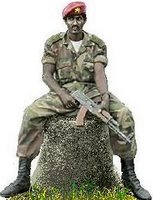Part II: Netsannet Demissie: Ethio Zagol on Netsanet
 Several months ago, I had a brief exchange with Ethio-Zagol after he commented on one of our postings, Netsanet le Netsanet Demissie. I am an unabashed admirer of Ethio-Zagol and his blog Seminawork. I have wanted to post his comments for a while but wanted to do so at an opportune moment. The repeated delay and postponement of the trials in Addis as well as the October 18, 2006 BBC report discussing Judge Wolde-Michael Meshesha’s investigation and the conclusions he reached that the Ethiopian government used excessive force to silence a people's call for democracy is as timely as it gets.
Several months ago, I had a brief exchange with Ethio-Zagol after he commented on one of our postings, Netsanet le Netsanet Demissie. I am an unabashed admirer of Ethio-Zagol and his blog Seminawork. I have wanted to post his comments for a while but wanted to do so at an opportune moment. The repeated delay and postponement of the trials in Addis as well as the October 18, 2006 BBC report discussing Judge Wolde-Michael Meshesha’s investigation and the conclusions he reached that the Ethiopian government used excessive force to silence a people's call for democracy is as timely as it gets.
From Ethio Zagol (publication by permission)
I read your great tribute to Netsanet. While most of your points are well taken, I have issues with some.
1. You compared the decision of the high court on the case of OSJE v.The Election Board with the landmark U.S. case of Marbury v.
More importantly, most of the decisions are dependent on political will. When the government pays less attention on a particular case, courts generally feel emboldened to act independently. However, when the government expresses its seriousness on a case, it will almost invariably use its influence to guarantee an outcome favorable to the government’s position. The decision you mentioned was decided at a time when the government was trying to act as democratic; having democratic institutions and an impartial judiciary. But the High Court decision was deliberately delayed to make the decision practically non-enforceable. That, together with the appeal of the election board and the stupid injunction order of the Federal Supreme Court forced the OSJE to curtail their ambitious plan of conducting election observation in all constituencies. They were limited to observing elections in and around Addis where both the ballot casting and the counting went very smoothly. So their internal report, which I reviewed, reflected their limitation and the relatively fair and free conduct of the election in Addis and its vicinities.
I took your point on the court decision seriously because the government later used it as a diplomatic and propaganda tool to show the independence of
In my opinion, a more appropriate example of a courageous decision was the one made by Judge Yalew Teshome (also of the High Court) in CUD v. The Election Board.
2. Relating with the first point you suggested that after Berhanu's decision, "what should’ve happened . . . was a complete review of the country’s electoral laws, and if necessary, a delay of the elections to ensure constitutional issues relating to electoral laws were completely vetted by the judiciary, CSOs, and interested parties."
I take issue with this statement on two grounds: first, a careful review of Judge Berhanu's decision will show that the decision did not imply that some provisions of the electoral laws contravene the constitution. Far from it. When ruling in favor of the OSJE, it actually followed a strict construction analysis, solely depending on the words of the electoral law. There was therefore no need for doing what you suggested. Second, even if it did imply what you might have assumed, reviewing the electoral laws would have been legally impossible as the rule of precedent does not work in
A brief Response to Ethio-Zagol:
Ethio-Zagol, we stand both corrected and learned. We have always hoped the blogs would engage in some type of dialogue, even debate—much like the drafters of the Federalist Papers who, under pseudonyms, exchanged some of the most enduring thoughts on American democracy 219 years ago. We do not mean to compare bloggers to the brilliant minds of the founding fathers who assembled in Philadelphia in 1787 (at least not myself) but several can arguably match their zeal and commitment in wanting to see the end of tyranny.
Writing on the OSJE decision was frustrating—in addition to our lay minds, none of us had ever read Judge Berhanu’s decision. We picked Judge Berhanu's finding that the NEBE's rulings “contravened the laws of the country” from several reports in the international media (to which we alluded in the links). We would love to read the judge’s entire decision, but even more, Judge Yalew Teshome’s.
One of the points you raised has been a source of amazement to us as well—the EPRDF’s twisted use of Judge Berhanu’s decision to show the supposed existence of the rule of law in Ethiopia—as if the government did not attempt to exert every pressure it could muster to prevent such decision from being handed down and enforced in time for the elections. Making a mockery of it and then turning around to adopt it as its own making is consistent with the EPRDF’s post-election campaign of lies it disseminated in Europe and the
________________________
Related stories: CIVICUS calls for the release of Daniel Bekele and Netsanet Demissie. Read the appeal here.
_______________________

